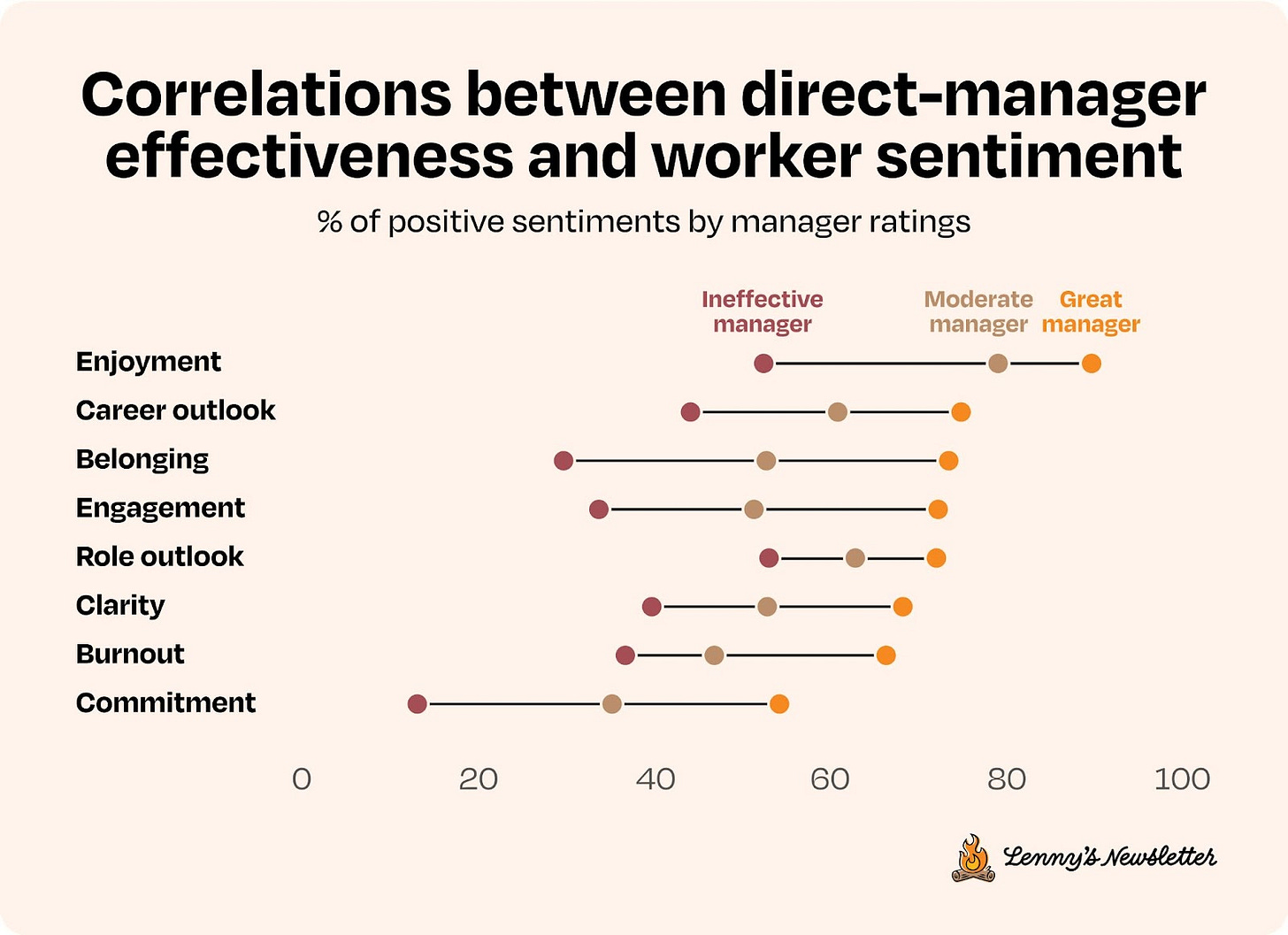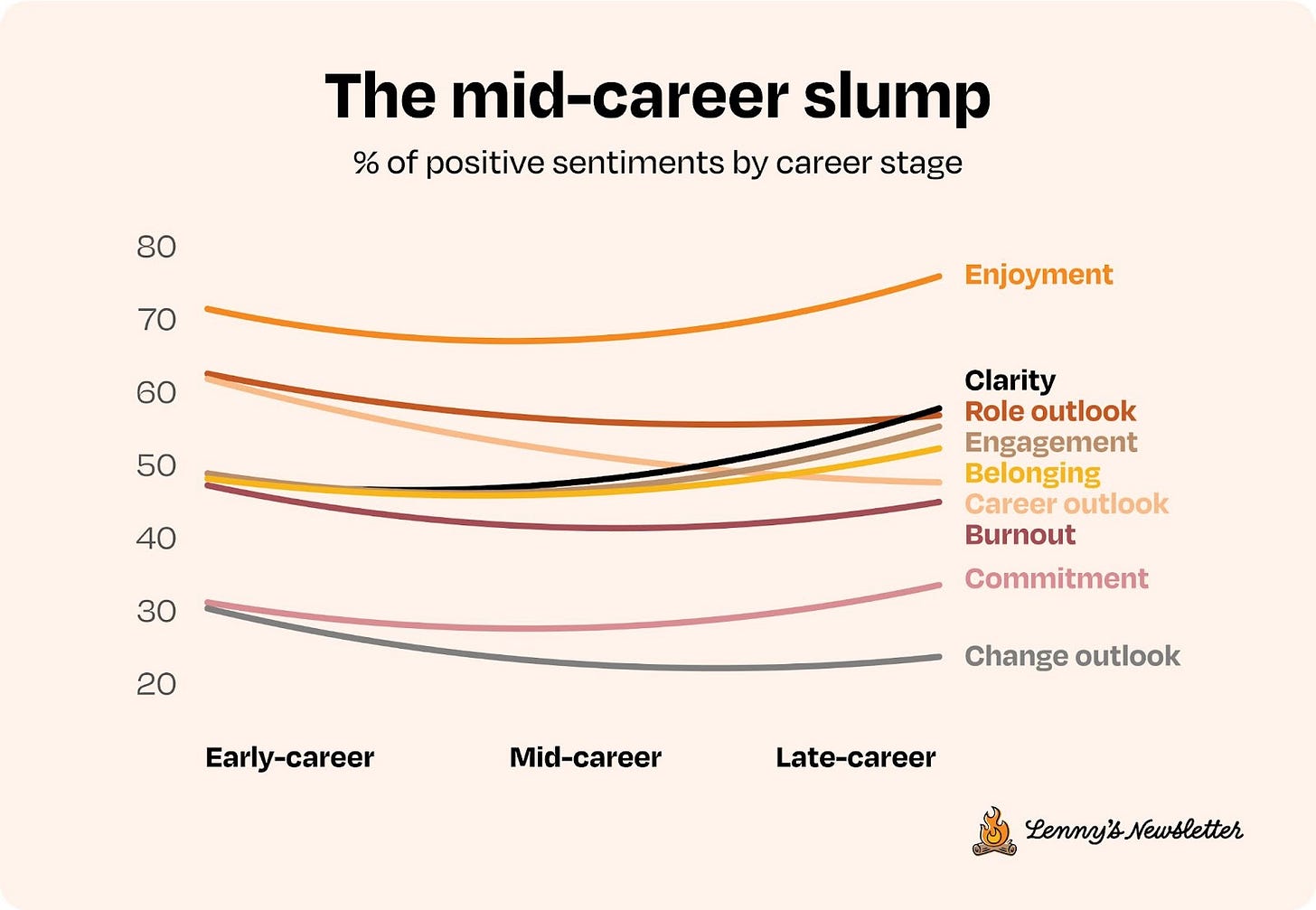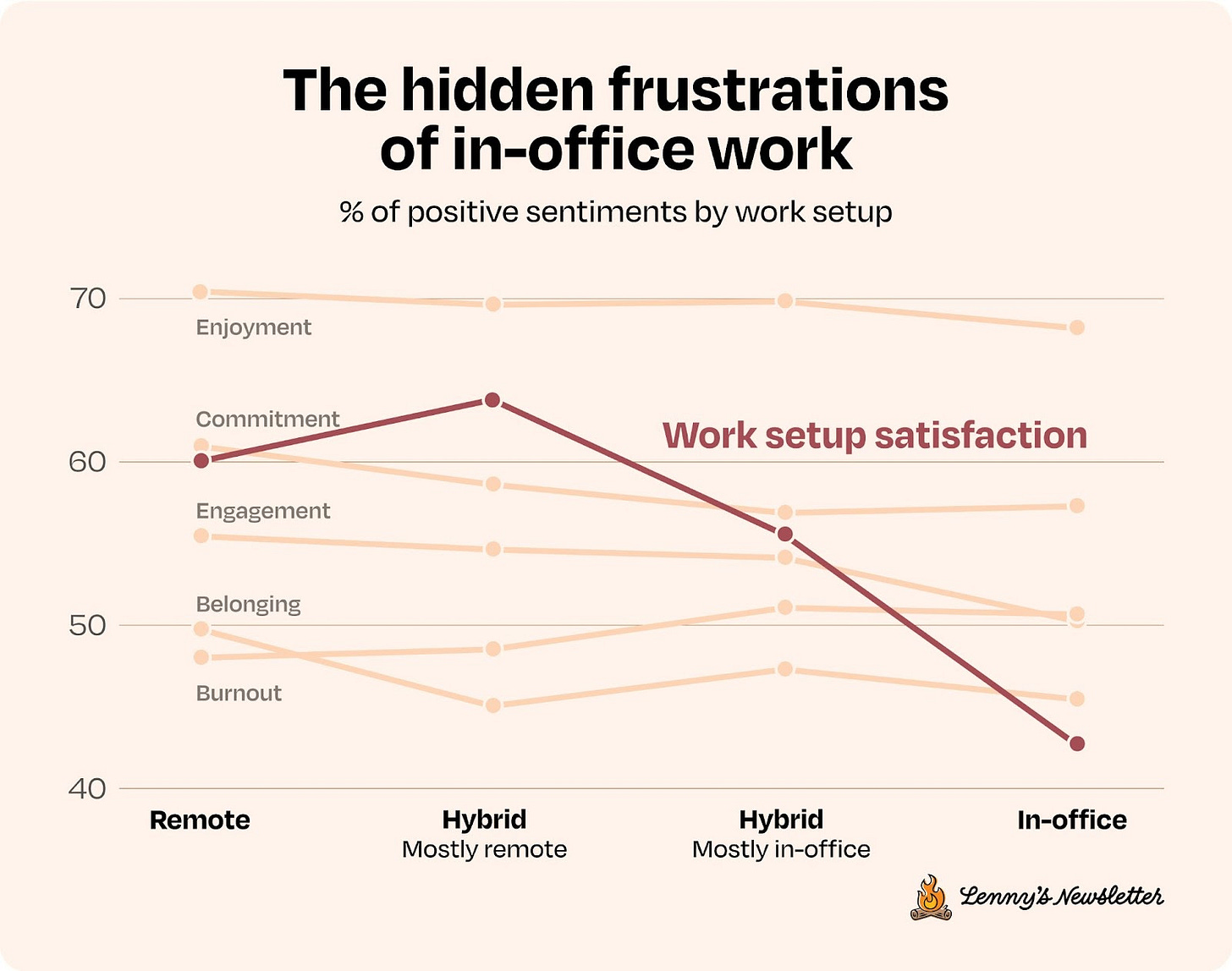Here I am, reading yet another article about how gen AI is going to replace jobs, especially in engineering, and talking with parents of new CS grads who are understandably worried. The narrative suggests tech workers are panicking about their careers as AI capabilities advance.
But that's not what the data shows.
The real crisis in tech isn't primarily AI displacement—at least not yet. It's management effectiveness, and the two factors are related since you need good leaders to drive healthy adoption. If you're not paying attention to this, you're likely to lose your best people to companies that actually know how to lead.
Mostly Optimistic, Major Burnout
Last month, Lenny's Newsletter dropped a comprehensive survey of tech worker sentiment, covering over 8,000 people across the industry. The findings? Most tech workers are cautiously optimistic about their careers. Even with AI breathing down their necks, 55% are positive about their career prospects (33% are negative). But that sentiment is headed down: 51% grew more pessimistic over the last year.
Much worse: 84% of tech workers report burnout, and 45% are currently experiencing significant burnout. Which sounds bad because it is bad. What's at fault? It's not because of robots—it's because of humans. Specifically, the humans leading and managing them.
But here's where it gets interesting. While CEOs focus on return-to-office policies, remote leadership was rated slightly more effective than in-office leadership, challenging common assumptions about remote management. Another data point that doesn't match conventional CEO wisdom.
Workplace flexibility moves the needle (more to come on this), but it's nothing compared to manager quality. Workers with great managers are 48% more engaged than those with poor managers, and here's a key finding: Workers "actively looking" for new opportunities are 5 times as likely to rate their manager poorly.
The phrase "people don't leave companies, they leave managers" comes to mind. Your retention challenge isn't remote work or "hybrid is hard"—it's management effectiveness.
The gaps between great managers and ineffective managers aren't the small deltas in workplace flexibility covered above—they're a chasm. Great managers make a huge difference on nearly every aspect of people's outlook, and even having moderate managers ("my manager doesn't suck") is a sizable win.
The challenge: only 27% of respondents said they have a great manager while 40% have an ineffective manager—doing the math, that leaves 33% of "meh" in the middle. Probably not a great time to have a bunch of burned-out, lower-engagement directors trying to support that next generation, right?
The Director Death Spiral
If you've been in tech leadership for the last few years, you know about the "director slump." It's that special level of organizational purgatory where you're overloaded and can't get time to put your hands on your craft, given tons of responsibility and limited authority. Your bosses are having closed-door sessions, then sending you the memo to pass along to increasingly burned-out employees about what's been decided.
The numbers are brutal. Mid-career professionals (7 to 14 years) report the most negative sentiment: 59% are significantly burned out (vs 45% overall), and researchers are predicting a full "manager crash" in 2025. Middle managers—non-executive level workers who oversee other workers—are historically less likely than their teams to feel supported by their superiors, and 75% of millennial middle managers feel overwhelmed, stressed, or burned out, with nearly half considering leaving their roles.
Why? Because we've turned directors into coordination hubs. They're managing up, down, and sideways simultaneously while getting limited strategic context they need to make good decisions. Middle managers typically hold an awkward in-between spot within a business, squeezed between those who are executing the work but not senior enough to get access to the full strategic picture.
It's a challenging position: responsible for outcomes without full control over the inputs.
The pressure comes from three directions at once:
🗜️ Do more with less: Executive demands to crank up efficiency while magically leveraging GenAI without training, time to experiment, or relief from current quarter goals.
🏢 RTO reality distortion: CEOs pushing office mandates while directors deal with distributed teams and mandates that don't match their team's needs.
🪓 The delayering disaster: Layoffs and "delayering" that have impacted 39% of directors and senior management vs 24% of ICs and only 20% of the C-suite.
We've removed layers of management without redesigning how organizations work, then wonder why the remaining directors burn out faster.
Everyone's Toast (But Some Are More Toasted)
When nearly half your workforce is running on fumes, you don't have a people problem—you have a systems problem.
The "do more with less" approach predates GenAI, but AI has added to the pressure. 77% of employees said AI has added to their workloads, rather than relieved their daily responsibilities. Recent reporting that Amazon has "raised output goals and become less forgiving about deadlines" fits what is happening more broadly in tech: essentially trying to solve for AI adoption by increasing pressure.
There's appeal to applying more structured approaches to "knowledge work": make it predictable, efficient, measurable, à la Taylorism. But knowledge work fundamentally differs from manufacturing: it depends on creativity and collaboration, and benefits from adaptability and autonomy.
The challenge, as I noted in February when I started hearing about this broadly, is that the training and support often isn't there, and the expectation of leaders can outstrip the reality of the tools—leading to the growing burnout crisis.
The Surprising Silver Linings
Want to know who's least burned out in tech? The data has some surprises:
Smaller companies: Workers at startups report lower burnout than those at mid-sized companies
Startup founders: They report higher job enjoyment (which resonates with my own experience)
Contractors and freelancers: Full-time employees experience nearly 2X the level of burnout as self-employed workers
What do these groups have in common? Greater autonomy, clearer purpose, and they're not caught in middle management structural challenges.
Remote and Hybrid Work are Working
Speaking of autonomy, Lenny's Newsletter also asked about tech worker workplace flexibility. Looking at the data, it's clearly not as important as other factors like company size or the quality of your leadership. That's one (amongst a million) reason why the whole RTO drive maddens me: all that wasted energy, largely driven by CEO beliefs and conventional wisdom.
The differences in satisfaction with work setups (aka your level of flexibility) are pretty clear and stark. "Mostly remote" hybrid appears to win, which makes sense given what we know about preferences and the value of regular time together. Other factors have pretty modest differences:
Fully remote workers have the highest commitment levels and lowest burnout numbers; they're slightly more engaged and report higher belonging.
Hybrid but mostly remote does quite well. Folks who are mostly in-office look a lot like fully in-office, but the 5-days-a-week crew still scores lowest overall.
Notably, there's only 5% of the participants who report they're in the office five days a week—which matches Flex Index data showing that 95% of tech firms have flexible work policies.
How to Fix This (Without Breaking More Things)
The solution isn't complicated, but it requires admitting that our management orthodoxy is broken. If you want to fix burnout, listen to what people are telling you causes it:
Be demanding on goals but realistic on metrics: 51% of employees say overwhelming load is the primary factor driving burnout. Leaders need to be hands-on themselves with AI tools to understand what's realistic, and focus on outcomes, not just increased output.
Invest in manager development: Poor management support comes in second, and tech workers were 48% more likely to say they had an ineffective manager than a good one. You can't just promote your best IC and hope they figure out leadership through osmosis.
Create clarity around expectations: 38% blame unclear job expectations for burnout, according to Forbes research. Clear priorities and the ability to say no to everything else makes a significant difference.
The Bottom Line
Tech's future doesn't depend on whether AI can code—it depends on whether humans can lead. The companies winning the talent war aren't the ones with the flashiest AI tools or the most aggressive RTO mandates. They're the ones that figured out how to create environments where people can do their best work without burning out in the process.
Your move, tech leadership. The data is clear, the path is obvious, and your best people are watching to see what you choose.
Three Things to Do This Week
Ask your managers how they're doing—and actually listen to the answer. Fewer than 20% of middle managers said their bosses had sat with them for active career conversations, according to Ceridian research.
Engage your Directors: You're losing the glue layer in the middle. Leadership investments in broader offsites, regular communication, and listening sessions are essential. More importantly, ensure you're sharing the reasoning behind decisions—transparency that's essential for the trust they need to build in teams.
Get hands-on with AI tools alongside your teams: Leaders who actively engage with AI tools and tailor adoption to different employee mindsets can drive an 89% increase in usage. Show commitment and drive engagement by learning together.
The future of work isn't about where we work or what tools we use—it's about whether we can create organizations that enable people to do their best work. And that starts with acknowledging that leadership effectiveness, not technology, drives outcomes.
Having manager burnout issues at your company? I'd love to hear about what's working (or not working) in your organization. Reach out: I’m brian@workforward.com
.









Amy and I talk about this on our podcast this week too. Important topic. https://www.youtube.com/watch?v=iE_9vomxHtI
What a depressing read. similar to various posts on Linkedin.
The richest, most successful companies in history treating their employees like dirt.
Really not good.
Antony